When people think about hair transplant in Turkey, most names come to mind, especially Istanbul. But there’s more to the story than one city. Different places can shape your experience, travel ease, cost, and recovery rhythm in ways you won’t notice until you’re actually there.
Our 2026 guide looks at the best cities in Turkey for hair transplants and what makes each one worth considering. We’ll tell about surgeon experience, clinic infrastructure, travel logistics, and the kind of support you can expect once you land. It’s less about ranking and more about helping you pick the right place for your trip and results.
At a Glance: Best Cities in Turkey for Hair Transplants
Istanbul sits at the center of the hair transplant scene. It has the highest concentration of experienced surgeons, the widest range of techniques, and the strongest aftercare systems. For international patients who want structured packages, easy logistics, and options, this is usually the first stop.
Ankara feels more clinical and quieter. Patients who care less about travel extras and more about doctor-led treatment often feel comfortable here. The pace is slower, and consultations tend to be very direct.
Izmir offers a softer experience. Clinics here combine medical standards with a relaxed, coastal setting. Many patients choose Izmir for privacy, comfort, and a calmer recovery week.
Antalya appeals to those who want recovery to feel like rest. Many clinics work with resort-style hotels, allowing patients to heal in a relaxed environment. This works well for people combining treatment with time off.
Prices change by city, surgeon, graft count, and what’s included, but most hair transplants in Turkey fall between $1,800 and $6,000 USD. Lower prices usually mean fewer inclusions or higher daily patient volume, so context matters.
Wherever you go, only choose clinics licensed by the Turkish Ministry of Health and, when possible, listed with USHAŞ. That confirmation matters more than city choice.
Most patients stay 4 to 6 days for surgery, first wash, and follow-up checks. Transfers, hotel stays, and translators are often part of the package, but always confirm in writing.
One final filter helps everywhere: avoid clinics advertising “unlimited grafts” or refusing to name the surgeon. Those signals look the same in every city, and they rarely lead anywhere good.
What Makes a City “Best” for a Hair Transplant in Turkey?
When you’re planning something as personal as a hair transplant in Turkey, the city you choose quietly shapes your whole experience, not just your results. Every city offers clinics, but not every city offers the same medical depth, safety, and patient comfort.
Surgeon density and specialization
Let’s start with the obvious: the best city for hair transplants in Turkey is usually where the best surgeons live and work.
According to USHAŞ (International Health Services Inc.), over 65% of Turkey’s international hair transplant procedures take place in Istanbul, home to hundreds of Ministry-licensed clinics and internationally trained doctors. That means surgeon choice is widest there, from boutique specialists to global centers handling 10+ patients a day.
But surgeon concentration alone isn’t everything. Cities like Ankara and Izmir have fewer clinics but more hospital-linked surgeons, often with backgrounds in dermatology or reconstructive surgery, ideal for patients prioritizing a more clinical, slower-paced environment.
Licensing and government oversight
Every legitimate clinic in Turkey must hold a license issued by the Turkish Ministry of Health. This license ensures procedures occur in medical-grade facilities with sterile operating rooms, not beauty salons or rented flats.
Always check the clinic’s USHAŞ registry number, an easy way to confirm that both the doctor and the clinic are authorized to treat international patients.
Technique availability
Advanced methods like Sapphire FUE and DHI (Direct Hair Implantation) are more common in Istanbul, where surgeons frequently update their protocols through ISHRS and European Hair Restoration Society (EHRS) congresses.
In smaller cities, classic FUE remains dominant, but quality is often steadier since doctors handle fewer patients per day.
Aftercare ecosystem
Hair transplant recovery doesn’t end at surgery, your city must make it easy to rest, wash, and move. Istanbul wins for convenience here: it has hotels specialized in post-op care, bilingual medical staff, and round-the-clock transfer services.

Antalya and Izmir, however, stand out for calmer environments and shorter recovery commutes, especially if you want to rest near the sea.
When you weigh these factors: surgeon access, verified licensing, advanced techniques, and recovery comfort, the “best” city isn’t universal. It’s personal.
And next, we’ll compare the top five: Istanbul, Ankara, Izmir, Antalya, and Bursa to help you decide where your best results might actually happen.
Istanbul: Turkey’s Global Hair Transplant Capital
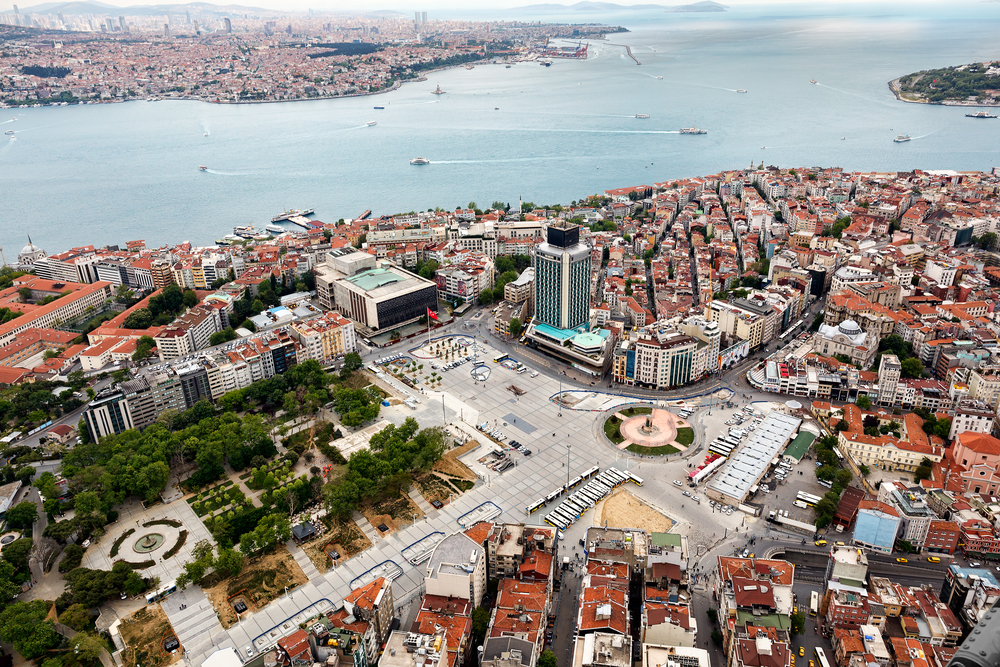
If Turkey is the world’s hair transplant hub, then Istanbul is its beating heart. More than two-thirds of all international procedures happen here each year, according to USHAŞ 2024 data, and it’s easy to see why.
Istanbul combines world-class surgeons, modern medical infrastructure, and the kind of travel convenience that makes the entire experience smoother, from the moment you land to the day you fly home with your first grafts in place.
Why Istanbul leads
Surgeon expertise and variety
Istanbul has the highest concentration of Ministry of Health–licensed clinics and internationally trained surgeons. Many hold memberships with ISHRS (International Society of Hair Restoration Surgery) and EHRS (European Hair Restoration Society), meaning they follow strict ethical and medical standards.
Whether you prefer Sapphire FUE, DHI, or a hybrid approach, Istanbul’s clinics have the equipment and staff to handle any technique. Surgeons here also treat diverse hair types from Middle Eastern and Mediterranean to African and Northern European, giving them unmatched versatility.
Easy access and travel support
Istanbul has two airports: IST (European side) and SAW (Asian side), both with direct flights from over 300 cities. Licensed clinics typically include airport transfers, hotel stays, and interpreters in their packages, which explains why most international patients describe the process as “surprisingly easy”.
Recovery-friendly environment
Istanbul’s hotels are used to medical tourism. Some even provide upright-sleep pillows and room-service menus tailored for post-op diets. The aftercare staff at major clinics speak fluent English, Arabic, French, and German, a huge plus for non-Turkish speakers navigating their recovery.
Potential downsides
Istanbul’s popularity comes with scale. Some clinics manage 10–20 patients a day, which can stretch staff attention. The key is to pick centers where your consultation and surgery are done personally by the named doctor, not just assistants.
Prices here range from $2,500–$3,500 USD on average, depending on graft count and surgeon reputation, slightly higher than other cities but balanced by experience and predictability.
Best suited for:
Travelers who want the widest technique options, most experienced surgeons, and strongest aftercare network, all in one city.
Ankara: Quiet Precision in the Capital
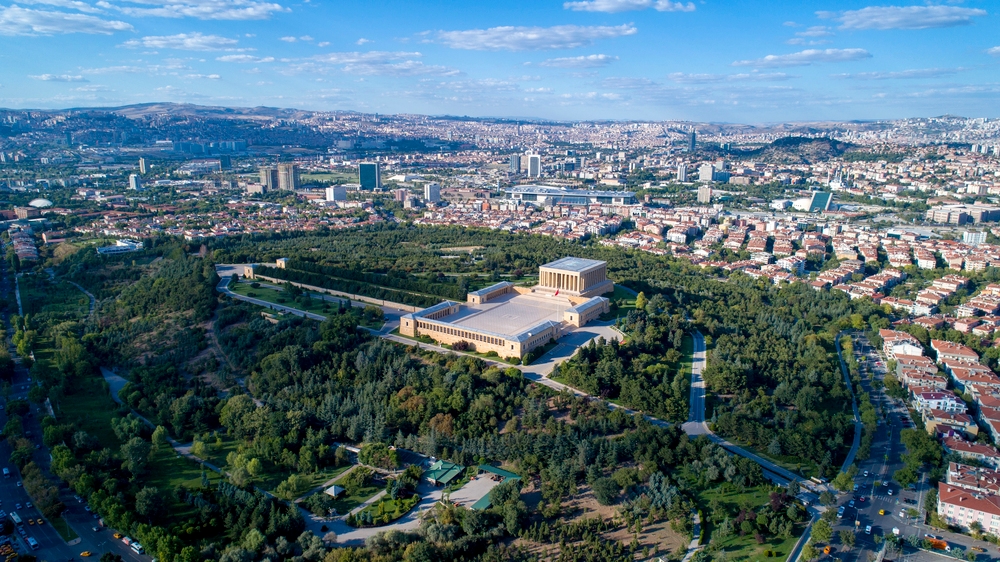
If Istanbul feels like a global medical hub buzzing with energy, Ankara is its calmer, more deliberate counterpart. As Turkey’s capital, it may not have the sheer number of hair transplant clinics, but what it offers instead is structure, precision, and medical professionalism rooted in its strong hospital network.
Why Ankara attracts certain patients
Doctor-led environment
Most of Ankara’s top hair transplant centers operate inside or beside university hospitals or multispecialty medical institutions. That means your surgeon is often a dermatologist or reconstructive specialist with years of academic experience, not just a technician-trained practitioner.
According to Turkish Ministry of Health data, Ankara ranks second nationwide in terms of licensed surgeons per capita. The city’s clinics typically handle fewer patients per day, giving each case more focused attention.
Steady standards, not volume
You won’t find aggressive advertising here. Clinics rely more on local reputation than influencer marketing. This is why many government employees, diplomats, and Turkish locals choose Ankara, the environment feels clinical, measured, and low-pressure.
Typical costs and treatments
Ankara’s pricing falls slightly below Istanbul’s, averaging $2,000–$3,000 USD per procedure. Most clinics offer FUE and Sapphire FUE as standard, with DHI available at higher-end centers.
Aftercare is straightforward that you can expect one-on-one post-op visits rather than concierge-style packages. Hotels and transfers are comfortable but simple, reflecting the city’s practical tone.
Accessibility and travel
Ankara’s Esenboğa Airport (ESB) connects to major European cities and all Turkish domestic routes. Clinics often provide free airport pickups, and most are within a 30–40 minute drive from the city center.
While Ankara lacks Istanbul’s tourist buzz, it compensates with quiet parks, art galleries, and café-lined boulevards, ideal for post-surgery walks without crowds or noise.
Best suited for:
Patients who value medical accuracy, calm surroundings, and doctor-led procedures over luxury packaging or sightseeing.
Izmir: Calm Recovery by the Aegean
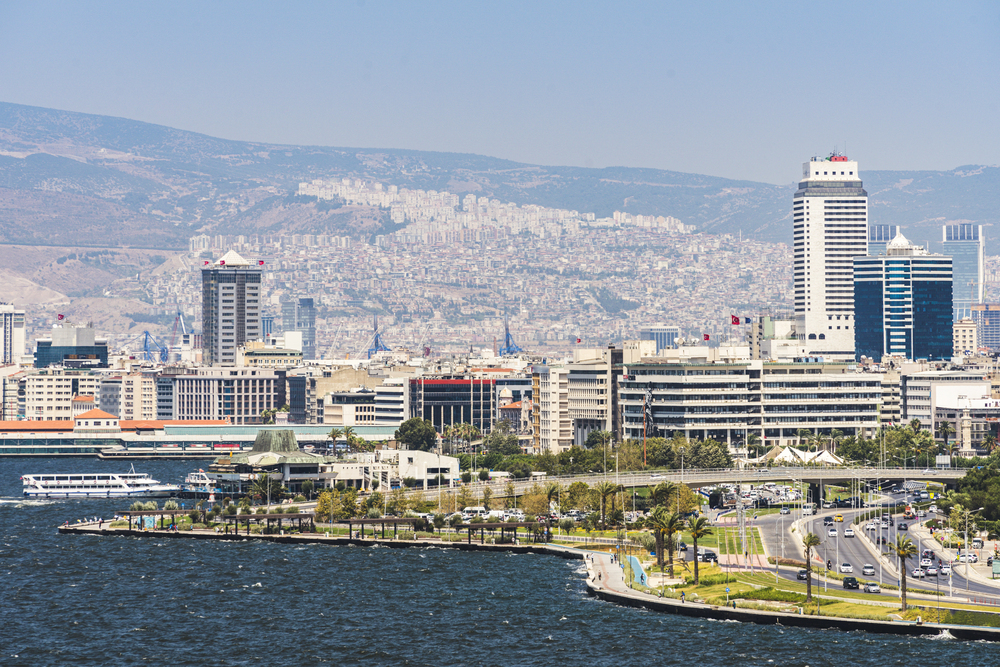
If Istanbul is Turkey’s energy and Ankara is its discipline, Izmir is its breath of fresh air, a coastal city where recovery feels like part of the therapy. It’s less hectic, more human, and ideal for anyone who wants professional care with the bonus of sea breeze and slower living.
Why Izmir stands out for hair transplants
Balanced mix of medical and lifestyle care
Izmir is home to several private hospitals and licensed aesthetic clinics recognized by the Turkish Ministry of Health, many of which also cater to European and Middle Eastern patients seeking a relaxed recovery environment.
Most are concentrated around Alsancak, Bornova, and Bayraklı, areas known for their clean, well-managed medical facilities and easy access to the waterfront.
Peaceful recovery environment
You won’t hear car horns or crowds outside your hotel window here. After surgery, you can enjoy short seaside walks, gentle sunsets along Kordon, and lighter air quality than bigger cities.
It’s the kind of place where your first post-wash coffee can happen by the sea, not in traffic.
Costs and clinic standards
Prices in Izmir tend to be 10–15% lower than Istanbul, ranging from $1,850–$2,750 USD, depending on technique and surgeon. Clinics here often focus on FUE and Sapphire FUE, with DHI available in select premium centers.
Many packages include 3–4 nights in boutique hotels close to the clinic, plus airport transfers from Adnan Menderes Airport (ADB), about 25 minutes from the city center.
According to USHAŞ data, Izmir has been rising in international medical tourism rankings since 2023, driven by higher patient satisfaction scores and cleaner post-op comfort metrics.
Accessibility & atmosphere
Flights to Izmir are frequent from Europe, especially Germany, France, and the Netherlands, markets that favor the Aegean’s calm over Istanbul’s chaos. The mild Mediterranean climate helps too: even in winter, it’s gentle enough for healing walks.
Best suited for:
Travelers seeking a quiet, scenic recovery, with professional care and lower crowd density, ideal for couples or solo travelers who prefer a low-stress stay near the sea.
Antalya: Hair Transplants Meet Holiday Comfort
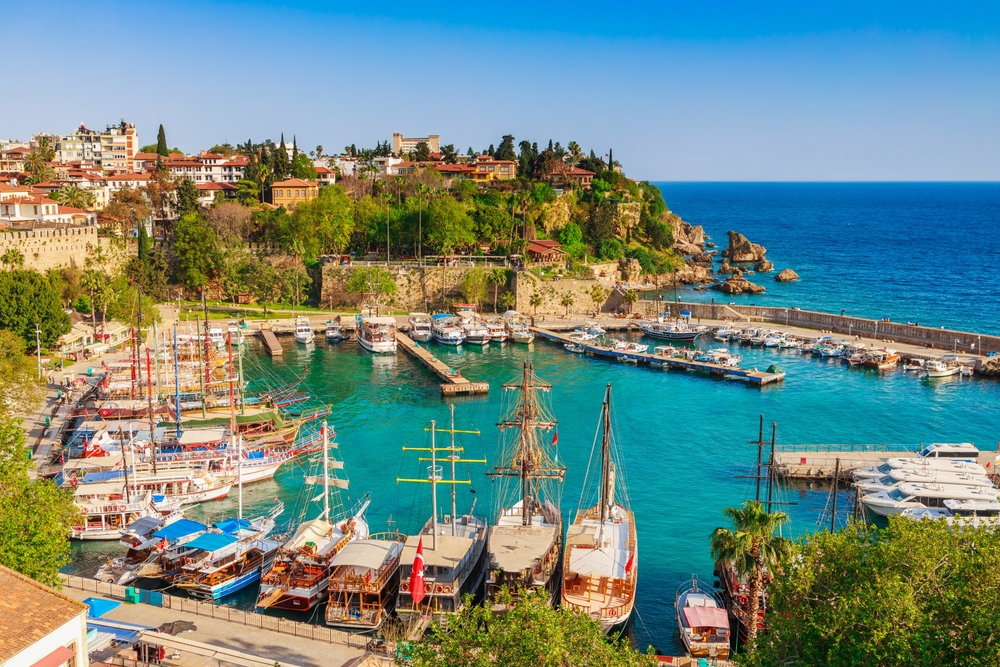
Few cities blend medicine and Mediterranean comfort as naturally as Antalya. Known for its turquoise coastline and five-star resorts, Antalya has become a favorite among patients who want their hair transplant in Turkey to feel more like a relaxing retreat than a medical procedure.
Why Antalya works for many international patients
All-inclusive packages with hotel luxury
Antalya’s clinics have leaned into the city’s hospitality DNA. Many work directly with top hotels, bundling surgery, accommodation, airport transfers, and aftercare in seamless packages. For travelers from the UK, Germany, and Gulf countries, it’s a practical way to combine surgery with short recovery holidays under the sun.
Tourism infrastructure adapted to medical care
Hospitals and private clinics here are fully licensed by the Turkish Ministry of Health, and several are registered with USHAŞ, allowing them to serve international patients legally.
The advantage? The same comfort you expect from a resort, but under clinical supervision.
Typical costs and techniques
Antalya’s prices fall in the mid-range, around $1,750–$2,800 USD, depending on graft count and technique. FUE and Sapphire FUE dominate here, with DHI offered by newer boutique clinics.
Many clinics schedule surgeries early in the week so patients can rest poolside for 3–4 days before flying home, with mild, coastal weather helping minimize swelling and irritation.
Who Antalya suits best
Antalya is perfect for those who value privacy, comfort, and a scenic recovery. It’s especially popular among couples who travel together, one recovers, the other relaxes. Direct flights to Antalya Airport (AYT) from most of Europe make the logistics easy.
Small caution
Because Antalya’s appeal is tourism-driven, check that your chosen clinic is a registered medical facility, not a beauty spa offering “hair implants”. Legitimate centers will always provide a license number and name of the operating surgeon before payment.
Costs & Packages by City
Let’s clear up one big misconception right away: not every hair transplant in Turkey costs the same, even though the ads might make it sound that way. The price you pay depends on the city, the surgeon’s involvement, the number of grafts, and what’s actually bundled into your package.
How pricing works across cities
Most Turkish clinics calculate costs per graft (each tiny follicular unit moved from the donor area). Others use flat packages for up to a certain number of grafts.
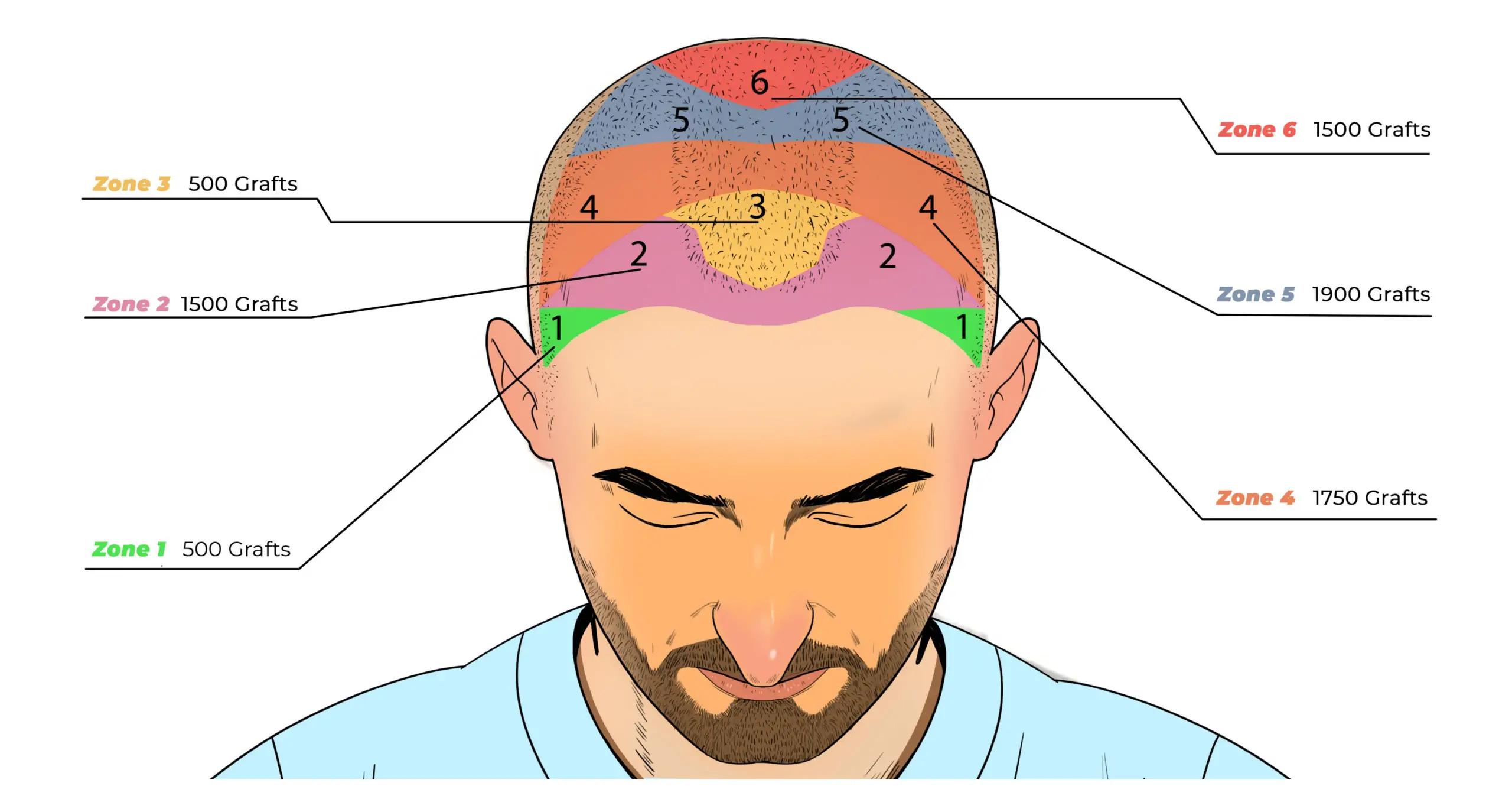
But here’s the key: cities with higher surgeon density and international patient flow like Istanbul, naturally sit at the upper end of the pricing range.
Here’s what that means in real terms:
- 2,000 grafts hair transplant cost Turkey: around $1,800 – $2,500
- 3,000 grafts hair transplant cost Turkey: roughly $2,800 – $3,800
- 5,000 grafts hair transplant cost Turkey: approximately $4,500 – $6,000
Those numbers mostly reflect Istanbul pricing, where clinics compete more on reputation than discount deals.
According to USHAŞ (2024) and the Turkish Health Tourism Association, the average national price range for a high-quality hair transplant remains 40–70% lower than comparable EU or UK procedures. That gap is mostly due to lower operational costs, not lower standards.
City-by-city differences
- Istanbul: Highest range, but widest surgeon choice, advanced techniques (Sapphire FUE, DHI), and strongest aftercare packages.
- Ankara: About 10–15% lower; slower pace, doctor-led cases, fewer bundled perks.
- Izmir: 15–20% lower; clinics often add boutique hotel stays or seaside recovery.
- Antalya: Similar to Izmir; prices rise in summer but include full hotel-based packages.
What “all-inclusive” should include
A true all-inclusive hair transplant package in Turkey should cover:
- Surgeon consultation and pre-op blood tests
- Operation with the named doctor (not just technicians)
- Post-op care kit and medications
- Airport–hotel–clinic transfers
- Hotel accommodation (3–5 nights typical)
- First wash and follow-up appointment
Istanbeautiful team insight: “If a clinic’s price seems too good to be true, it usually means something’s missing, often the doctor’s actual presence during surgery.”
Travel & Recovery Logistics: What to Know Before Booking
One of the most common questions travelers ask before coming to Turkey for a hair transplant is: How long do I actually need to stay? The good news and one reason Turkey dominates the market, is that the timeline is short, efficient, and travel-friendly.
How long to stay in Turkey for a hair transplant
For most modern procedures like FUE or DHI, a stay of 4 to 6 days is enough:
- Day 1: Arrival, pre-op tests, and consultation
- Day 2: Operation day
- Day 3: Rest and light check-up
- Day 4: First wash and aftercare session
- Day 5–6: Optional final review, then departure
That’s it. The recovery itself continues once you’re back home, swelling eases in a few days, scabs in a week, and normal routines resume after two.
According to Healthline and ISHRS (2024) guidance, patients can safely fly within 48–72 hours post-procedure if no complications occur. Turkish clinics often schedule your wash and follow-up within that window to ensure you’re cleared for travel.
Travel logistics that make it easier
Turkey’s major hair transplant cities, Istanbul, Ankara, Izmir, and Antalya all have international airports within 30–45 minutes of their clinic zones. Istanbul alone has two (IST and SAW), serving over 300 global destinations.
Licensed clinics typically include airport transfers, accommodation, and translation services in your package, so you won’t need to arrange taxis or local bookings yourself.
Best time of year to travel
For comfort and recovery, avoid Turkey’s hottest months (mid-July to early September). Spring (April–June) and autumn (September–November) are ideal, warm enough for sightseeing, mild enough for healing.
Winter months (December–February) are perfectly fine medically but less pleasant for walking tours or outdoor recovery.
Extra tip for recovery travel
Bring a neck pillow for your flight home, choose loose shirts (no pulling over your head), and consider extending your stay by a day if you want to explore before surgery rather than after. You’ll enjoy the city more without worrying about your new grafts.
Our Picks of the Best Hair Transplant Clinics in Turkey
We’ve published full, updated guides, complete with clinic information, surgeon profiles, cost comparisons, and patient feedback summaries. For the latest recommendations and real patient insights, visit: Best Hair Transplant Clinics in Turkey